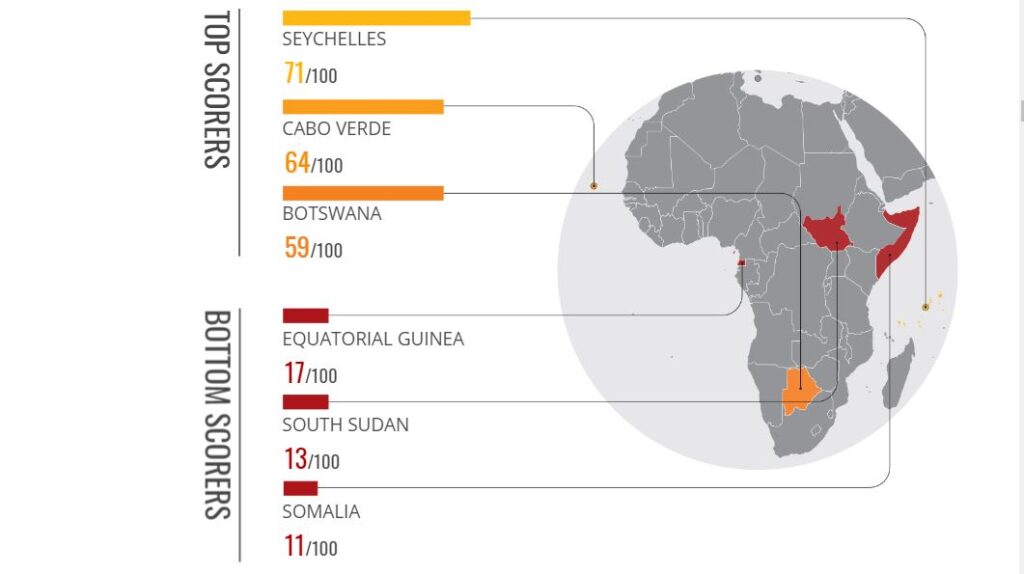- Somalia, South Sudan and Equatorial Guinea have emerged as the most corrupt countries in Africa in the 2023 Corruption Perception Index (CPI) by Transparency International.
- Liberia (25) has declined 16 points in the CPI score since 2016 while Mali (28) has dropped seven points in the CPI ranking since 2015.
- In 2023, Gabon ranked (28) having lost a similar number of points like troubled Mali since 2016.
Somalia, South Sudan and Equatorial Guinea have emerged as the most corrupt countries in Africa in the 2023 Corruption Perception Index (CPI) by Transparency International (TI). Equatorial Guinea (17), South Sudan (13) and Somalia (11) scored the lowest with TI saying these economies showed “no sign of improvement.”
Liberia (25) has declined 16 points in the CPI score since 2016 while Mali (28) has dropped seven points in the CPI ranking since 2015. In 2023, Gabon ranked (28) having lost a similar number of points like troubled Mali since 2016.
Rwanda emerged the best-performing country in East Africa in fighting corruption with a CPI score of 53 followed by Tanzania with 40. They were followed by Uganda (26) and Kenya with a score of 31.
Overall, the 2023 CPI shows that African countries experienced a lack of progress in the fight against corruption, sustaining the region’s persistent low performance, reflected in an unchanged regional average score of 33 out of 100. A jaw-dropping 90 per cent of countries in Sub-Saharan Africa scored below 50.
Seychelles (CPI score of 71 remains the top scorer in the Sub-Saharan Africa region, followed by Cabo Verde (64) and Botswana (59). CPI ranks 180 countries and territories by their perceived levels of public sector corruption on a scale of zero (highly corrupt) to 100 (very clean).
These revelations come despite a regional survey highlighting corruption as one of the most pressing issues Africans want their governments to tackle, the 2023 CPI reveals that countries in Sub-Saharan Africa still have a considerable distance to cover in their endeavors to combat corruption.
Prevalence of corruption across Africa
The cases of corruption and associated challenges within the justice systems vary across Africa, manifesting through reports of bribery, extortion, and political interference in countries like Nigeria (25).
In Burundi (20), there have been cases of the dismissal and imprisonment of magistrates accused of corruption, while in the Democratic Republic of Congo (20), there are instances of the denial of justice for victims of human rights violations.
These examples underscore the vital role of the justice system in upholding fundamental human rights and promoting social equity.
What’s more, Transparency International said democracy faces significant pressures across Africa, with a notable increase in unconstitutional changes in some of the lowest-scoring countries, including Mali (28), Guinea (26), Niger (32), and Gabon (28).
Additionally, insecurity and corruption are cited as the primary underlying reasons for these challenges. Since 2020, countries in the Sahel region and Central Africa have experienced nine coups, further underscoring the fragility of democratic institutions in these areas.
Samuel Kaninda, Africa Regional Advisor of Transparency International said: “With the resurgence of coups and conflicts happening in a number of countries on the continent, democracy across Africa is under pressure. Addressing the underlying governance deficits becomes an urgent imperative. Strengthening the judiciary and having functioning accountability mechanisms are key to ending the continued backsliding of the region in its fight against corruption.”
Most corrupt countries in Africa: why all eyes are on Gabon
Despite being considered one of the most prosperous and stable countries in Central Africa, Gabon’s (28) performance in the 2023 CPI is on the decline. The five-decade long dominance of the Bongo family in the country’s political landscape has limited transparency and accountability, the report highlighted.
Recent surveys reveal that nine out of 10 Gabonese citizens give a thumbs down to the government’s anti-corruption measures and fear reprisals for reporting corruption.
In August 2023, a military coup got underway shortly after strongman Ali Bongo was declared the winner of the presidential election held earlier that month. Although the coup was unconstitutional, political opposition leaders and civil actors perceived it as an opportunity to put an end to over half a century of Bongo family rule and restore order following what they deemed chaotic elections.
The new military-led government prioritized the fight against corruption, highlighting the reactivation of an anti-corruption task force to investigate all projects for which contractors received payment without completing the work.
Read also: 2024 outlook: Corruption and cybercrime emerge as biggest threats facing Kenyan firms
Where anti-corruption efforts are paying dividends
According to 2023 CPI, Seychelles (71) and Angola (33) continue to make significant strides in their fight against corruption. Over the last decade, Seychelles has seen a notable increase of 19 points in its CPI score, while oil-rich Angola has shown improvement by 14 points since 2019.
Both nations share common anti-corruption initiatives, including consistent efforts to reclaim stolen assets and transparently holding alleged wrongdoers accountable through their national justice systems.
Angola for instance successfully implemented an anti-corruption strategy spanning 2018-2022. These initiatives, coupled with various judicial reforms, have resulted in the recovery of US$ 3.3 billion in assets by the sovereign wealth fund.
Additionally, Côte d’Ivoire (40) has shown steady improvement over the last decade, witnessing a thirteen-point increase since 2013, the report says.
Following years of war since start of the century and a political standoff post the 2010 presidential elections, President Alassane Ouattara’s administration has successfully rolled out various reforms.
These reforms include a law on prevention and repression, establishing a national anti-corruption authority, mandating senior officials to declare wealth upon assuming duty, introducing economic and financial crimes sections in the court system, implementing toll-free corruption reporting lines, and issuing a decree to combat money laundering.
Equally improving is Cabo Verde (64), an economy that recently passed a law, creating an online platform for judicial officers to drastically cut persistent delays while also tackling pending court proceedings.
